In the nutritional and functional medical world, “heavy metal” testing seem to be huge buzz words over the past couple of years. You hear about it on the inter web, people mentioning they are thinking about having it done, have had it done, or want to get it done. For me, it wasn’t until the past month or so that I even made the consideration to get a test for myself. When I began feeling a bit more off (than usual) I knew I had to start playing detective on myself yet again.
Bear with me for a minute though. I’ll get back to the heavy metal testing after the back story….
I had been doing great health wise, conditions all seemed to be at bay, and then out of nowhere everything flared up again (spinal disease triggered fibromyalgia triggered my broken ankle triggered my shoulder issues and so on… I’m a hot mess I know). Unlike the previous flare ups though, this one has been hard to shake. In all honesty, it also didn’t feel like my regular flare ups. This time was different. And when you dedicate TWO entire years of your life to your health and I mean day in and day out, trying desperately to narrow things down and weed conditions out (because of course conventional medicine continues to fail me and many in our society today) you get to know your body and its interworking’s pretty damn good. You begin to get more in tune with your body, more than you ever thought possible.
So when things felt more “off” for me, I knew it was back to the drawing board with research…
Something told me that my thyroid was a bit off. I’ve actually suspected if for the past few months now, so when it came time for my routine blood work my primary doctor flat out REFUSED to include a full thyroid panel. She only put in orders for TSH (thyroid-stimulating hormone) which turned out to be within normal range (low, but “normal”). Unfortunately this marker alone does NOT tell you everything that is going on with thyroid function. And for those who don’t know… the thyroid is a little butterfly shaped endocrine gland located in your neck and the paramount of metabolic health. It sets the pace at which your ENTIRE body operates and functions.
So yeah, pretty important to have a thyroid that is functioning optimally right?
Yet conventional doctors rely on TSH values alone as the be all, end all marker for thyroid health. Did you know that TSH is actually a pituitary hormone messenger? Yes, they are using a pituitary hormone to evaluate your thyroid health! The problem with this? That single TSH test actually doesn’t measure if ALL of your cells and tissues are receiving the released thyroid hormones. Not sure they were even taught in medical school that other hormones like T3 (energy hormone), T4 (storage hormone), reverse T3 (emergency break hormone) are often times MORE important to test and a much better indicator of thyroid function?! And in all honesty, what harm would it make to HER putting in the other tests? She isn’t paying for it… I thought I was with the thousands and thousands and thousands of dollars we pay towards insurance every single year since birth.
Bitter much? Yup, sure am.
What’s a girl to do when your doctor won’t listen and won’t advocate for you?
YOU ADVOCATE FOR YOURSELF
And its exactly what I have been doing for TWO years straight, this time would be no different. Doctors don’t want to help me, so I help myself. First order of business this time around was ordering a full thyroid panel (and paying totally out of pocket for it mind you). Results came in and while my values are within “normal” range, my T3 is certainly nowhere near OPTIMAL range. Based on the extensive research I had done, that T3 level should remain in the TOP half of the range. I’m at the bottom, dirt bottom.
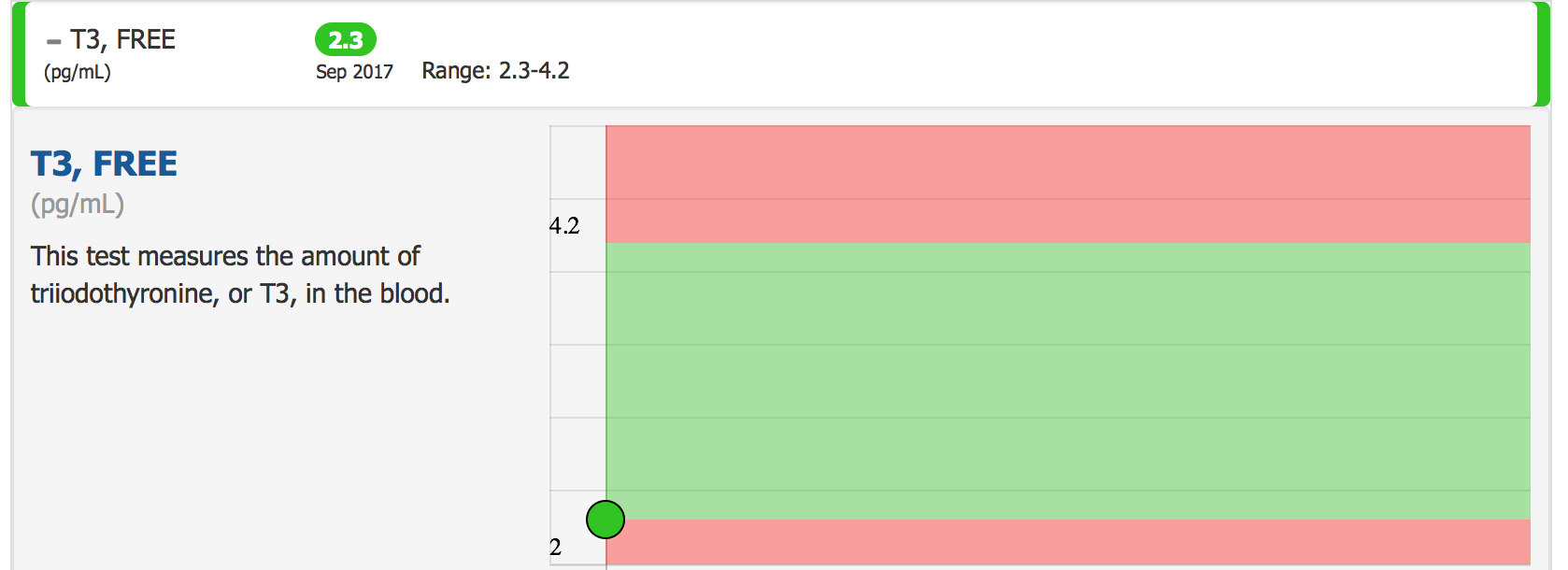
Next step once I had my information? One would think I’d go back to my doctor with the information huh? Nope, hell no. I know exactly what she would say “Well, you’re still in normal range and your TSH is normal. Thats great! Nope, no need to do anything.” Basically that means, you continue to feel like shit, I won’t do anything about it because I can’t do anything for you. Story of my life these past two years.
Anyways, I digress.
So what did I do next with the knowledge about with my low T3 levels (without the presence of high thyroid antibodies<< important to note!)???
First… more research. I needed to make sure that the symptoms I was experiencing correlated with the values in my blood work.
Potential Symptoms of Low T3:
(I’ve highlighted the items I currently experience)
- Cold body temperature & extremities (less than 98.0 degrees)
- Low resting heart rate despite being overweight and non-conditioned (resting heart rate less than 50-60)
- Weight gain and/or weight loss resistance
- Decreased energy levels and inability to sustain activity levels for long periods of time (even low intensity exercises like walking cause worsening fatigue)
- Other hormonal problems including: estrogen dominance, low progesterone levels, insulin resistance and/or leptin resistance
- Chronic pain and/or chronic muscle tension/cramps
- Hair loss, hair breakage, and/or brittle/damaged nails
- Weakness and fatigue
- Difficulty sleeping
- Increased sensitivity to heat or cold
- Dry skin or puffy skin
- Dry, irritated, puffy, or bulging eyes
- Hand tremors
And of course I also had to take a look at root issues that could be causing my issues.
Potential Causes for Low T3:
- inflammation (this I have completely under control through diet)
- oxidative stress (always room for improvement here with all of the free radicals, toxins, and chemicals we are exposed to daily)
- serious acute or chronic disease (not in the heart/liver/kidney disease capacity, but certainly in the broader sense of the concept with my ongoing medical conditions)
- caloric restriction (definitely do NOT restrict my intake, BUT increasing food will be an experiment I want to try)
- physical/emotional trauma
So it certainly looks like there is a direct correlation between my symptoms, markers, and potential causes. Now it’s time to come up with the plan of action to help improve it all! Because my testing didn’t reveal anything completely off the charts or reasons why I needed to seek immediate help from my doctors, I was certain that I could take a very moderate, yet proactive approach to healing. There wasn’t a need to jump on any type of medication therapy or anything like that. My mantra for the past two years has been “Let food be thy medicine. Let medicine be thy food.” That certainly wasn’t going to change now.
Immediate plan of attack here for me:
- boost conversion of T4 to T3
- reduce reverse T3 levels
- increase thyroid production
- dietary changes
- optimize adrenal function
STEP 1: boost conversion of T4 to T3
From the information I have gathered, it seems as though when anyone talks about thyroid health the two things that come up over and over and over again are #1 IODINE. Iodine stands to reason because its actually the element that is needed for the production of thyroid hormone! Now where do you get iodine in the first place?
FOODS RICH IN IODINE
(and I’ve cross out the ones that are NOT a part of my regular “diet”)
cheese
Cows milk
Eggs
Frozen Yogurt
Ice Cream
Iodine-containing multivitamins
Iodized table salt
Saltwater fish
Seaweed (including kelp, dulse, nori)
Shellfish
Soy milk
Soy sauce
Yogurt
Yeah, not left with many iodine rich foods each day huh? And I really only started eating seafood about a year ago (literally didn’t eat ANY my entire life, absolutely hated it… or so I thought). So that basically leaves me with eggs (which I rarely eat), fish (which I only eat a couple of times a week at best, seaweed (which I do actually have regularly), and shellfish (which I probably only eat once every few months).
Iodine deficient much? You bet! Well, probably anyways….
And the #2 element/mineral I saw over and over again regarding thyroid health was selenium. Selenium is a powerful antioxidant which also happens to be a major player in the conversion of T4 to T3. In addition, selenium also counteracts oxidative stress and inflammation as well as serving as a precursor to glutathione, the ultimate antioxidant!
FOODS RICH IN SELENIUM
(and I’ve cross out the ones that are NOT a part of my regular “diet”)
Brazil nuts
Yellowfin tuna
Halibut, cooked
Sardines, canned
Grass-fed beef
Turkey, boneless
Beef liver
Chicken
Egg
Spinach
Better list than iodine, thats for sure! But I know I could probably do better. And now I can finally circle back to that heavy metal testing I mentioned at the beginning of this post!!!
Before I jumped right into adding a bunch of iodine rich foods and various supplements into my daily routine I first wanted to get a baseline for my iodine and selenium levels already present in my body. Knowing my primary doctor wouldn’t test me for it, I was left to my own devices and began researching labs that offered those particular tests. One of the first ones that came up in my search was EverlyWell.
I was pleasantly surprised to see that in addition to having my iodine and selenium tested, this kit included:
Now why is it a good idea to get tested for these markers?
“Harmful elements, heavy metals, and other environmental pollutants can be found all around us. They’re in the water we drink, food we eat, air we breathe, and environment we touch.
These pollutants can greatly increase our risk of developing serious health conditions like infertility, diabetes, dementia, and cancer.
When levels are elevated, they are also known to cause damage to the liver, kidneys and brain, as well as the cardiovascular, nervous and endocrine systems.
Conversely, there are certain environmental elements that are essential to your everyday health and normal bodily function. It’s extremely important that we minimize contact with the toxic elements while keeping the necessary ones in an optimal range.
Our heavy metals test is the perfect way to determine whether or not you’ve been exposed to any of these dangerous elements while also checking if the other elements are within the optimal range.”
Potential Symptoms Related to Heavy Metal Toxicty?
(and I’ve crossed off issues that I do NOT currently have)
Alcohol intolerance (wouldn’t know because I don’t drink any alcohol)- Allergies (environmental and food sensitivities)
- Anxious and irritable
- Brain fog
Cannot lose weight (also not trying though)- Chronic unexplained pain
- Coated tongue
- Cold hands and feet
- Dark circles under the eyes
Depression- Digestive problems
- Extreme fatigue
Frequent colds and flus- Headaches
urinary issues- Insomnia
- Intolerance to medications & vitamins
- Loss of memory and forgetfulness
- Low body temperature
- Metallic taste in mouth
- Muscle and joint pain
- Muscle tics or twitches
- Muscle tremors
- Night sweats
Parasites (don’t know for certain)- Prone to mood swings
- Prone to rashes
- Sensitive teeth
- Sensitive to smells like tobacco smoke, perfumes, paint fumes, and chemical odors
- Skin problems
Small black spots on your gums- Sore or receding gums
- Tingling in the extremities
Pretty hefty list for my own symptoms right? Most of these NONE of my doctors can or have ever given an explanation for. Yes, my spinal disease will cause things like muscular issues, tingling, and pain but outside of that? Yup… this is definitely the test I think would be useful in narrowing things down AND for getting that baseline for iodine and selenium for my thyroid function!
When I chatted with the company about my desire to take the test, why I felt I needed it, what their thoughts were, they were so kind to offer to collaborate with me on this little experiment and here we are! Although its tedious and daunting having to be your own biohacker, I will say its also extremely interesting and fun 🙂
Kit arrived within a few days and I was off to the races.
Pretty self explanatory on how to collect the specimen, clearly written instructions, and very thorough information. Test was completed, sent back, and within about a week my results were in:
Definitely some things I can make an effort to increase AND decrease my exposure to! Fascinating being able to see all of these numbers isn’t? I totally NERD out on this type of stuff. While I encourage people and clients to go by how they feel, it’s always a good idea to get baselines of things before adding or taking anything away from your current routine. Now you know what you are working with, you can choose to take a more or less aggressive approach. For me… its going to be much less aggressive!
For iodine, I have decided (for now) I will solely supplement only via food. While it is required for the creation of thyroid hormone, it can be tricky because you do not want to overdo it ESPECIALLY when it comes to those who suffer from autoimmune thyroid problems (Hashimoto’s). Also because my EverlyWell test shows moderate levels of iodine already, I feel no need to go overboard.
Here are the foods I will be adding in more regularly:
KELP NOODLES
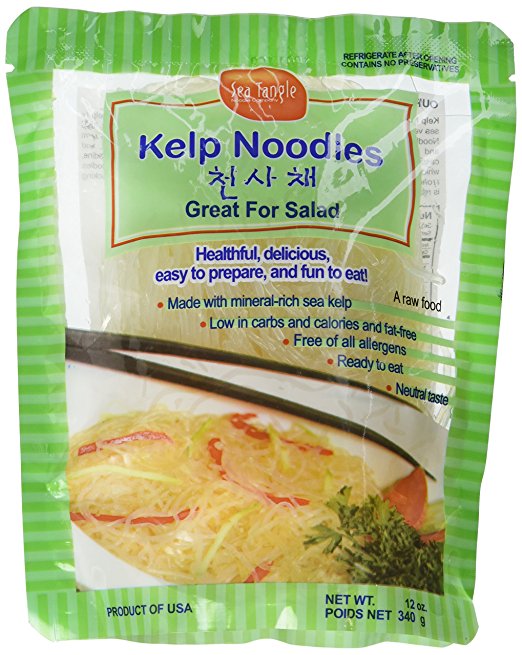
DULSE FLAKES
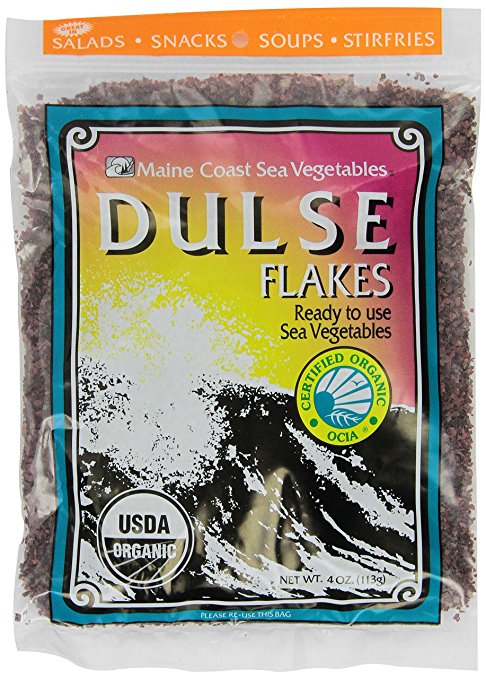
DULSE GRANULES
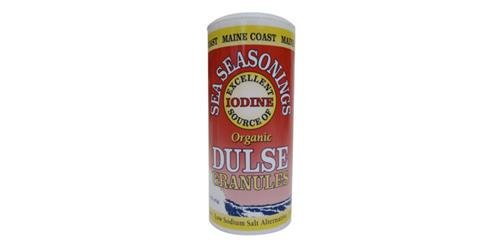
KELP GRANULES
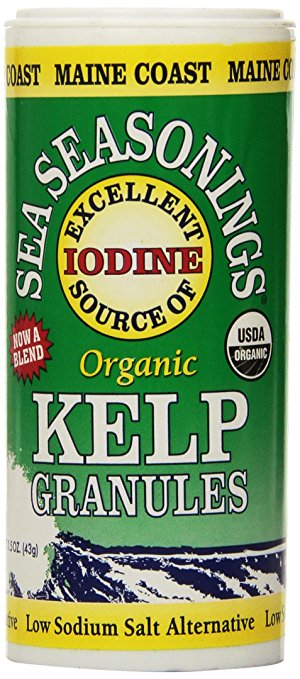
For selenium, I would 100% stick to brazil nuts because they are very high in the mineral (and totally keto), but unfortunately I am highly intolerant to them! Instead I will be making a conscious effort to include more of these foods:
- yellow fin tuna
- grass fed beef
- sardines, turkey
- beef liver
- eggs
- spinach
In addition, I will also be taking a very low dose supplement for a short period of time to see if it makes any type of difference. These are 200 mcg and I am splitting them in half each day.
SELENIUM
STEP 2: reduce reverse T3 levels
** Inflammation- As I said previously, my inflammatory markers have ALL been brought down through diet/nutrition so no big changes going on there. I will continue keto, but make some modifications along the way.
** Improve gut health- Since 20% of T4 is actually converted in the stomach, this is definitely significant enough to improve upon. I’ve already made leaps and bounds in my digestive health by simply removing the foods that I am extremely sensitive/intolerant to so I’m a step ahead of the game. A few things that I plan on doing now though are:
1.) reintroducing digestive enzymes-
Betaine HCl Pepsin & Bitters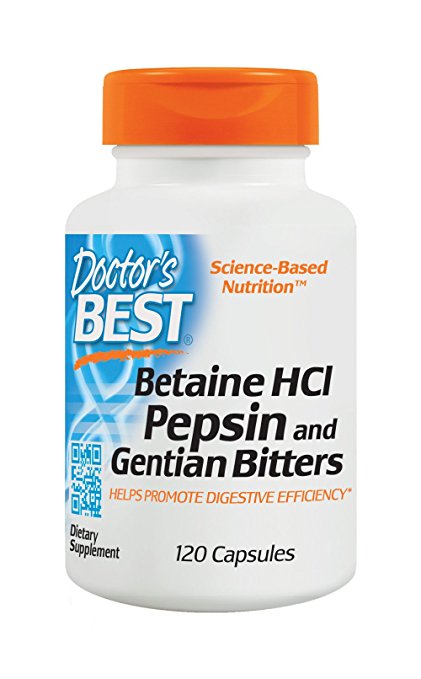
2.) beginning a new cycle of probiotics-
VSL #3
(this is one of the BEST you can find anywhere, it’s what Dr. Wahl’s suggests in her protocol)

Step 3: increase thyroid production
In addition to the increased selenium and iodine, I’m bumping up a few other nutrients to help improve my thyroid function.
1.) Zinc- this is a trace mineral that is required for thyroid hormone synthesis. Zinc deficiency and hypothyroidism symptoms have been known to include dry skin and hair loss. While I will ramp up foods that are rich in zinc such as eggs, wild-caught salmon, grass-fed beef and organ meat, pumpkin/chia seeds, and spinach… I have also decided to begin a low dose supplement as well.
2.) Fat Soluble Vitamins- I already take a vitamin D supplement which has definitely improved my levels, but I will be increasing my dosage to 3,000 AND taking K2 to help with its absorption. I have also added in a vitamin E supplement that I will test out for a few weeks and see how I feel.
3.) Vitamin B- this is a tricky on for me because after my last set of blood work, my B12 levels were nearly off the chart (and not in a good way). I was advised to reduce my intake to balance out a bit more. For thyroid though, it is strongly suggested to take a Vitamin B complex. Unfortunately this may throw my B12 out of whack again, so I’ve decided to hold off on the complex for now.
However (sidetone here), after watching THIS video by High Intensity Health, I thought I would go ahead and give some vitamin B5 (pantothenic acid) a try in hopes that it helps with my sleep. As suggested in the video, I started to take both my vitamin D, K2, and Vitamin B5 in the evening time. It’s only been about a week now and I have to say I have seen a HUGE difference in my sleep. Like HUGE friends. This change and the next dietary changes I’m going to discuss are all proving to be moving me in the right direction.
Step 4: “diet”ary changes
You know I love my keto friends, but this is a prime example of how classic ketogenic diets aren’t necessarily a one sized fits all for everyone. At some point you may need to adjust your macronutrients either because you aren’t feeling optimal, progress slows, or simply because you want to. ALL of those reasons are OK and one should be allowed to without feeling the dogma attached to “that isn’t keto, you aren’t keto, you’re doing keto wrong”. Last time I checked nobody else was living in our bodies, so it’s unfair for people to make blanket statements on what works best for YOU.
As far as my thyroid and overall health goes, some changes I will be making now are:
1.) MORE carb up days- I currently do 2-3 per week depending on how I feel and what my body is telling me, but now I will be doing at least 4-5 carb up practices per week. These are NOT looked at as “cheat days” as I don’t believe or condone that type of disordered thinking, but rather they are calculated and mindful. Each night I’m carbing up will simply include about 50 EXTRA grams of carbohydrates coming solely from sweet potatoes, beets, other root vegetables, kefir/yogurt, fruit, or rice.
3.) MORE calories- like I said earlier, I don’t restrict my calories. Never have, never will. At my size and my activity level (basically sedentary), I’m already eating well above “maintenance”, but I’m going to do a little experiment on myself and make a conscious effort to eat in a bigger caloric surplus. If my body needs to heal the last the I want to do is not give it the proper nutrients and intake it may require. Those treating thyroid issues should also realize that dieting and restriction actually signals to your body to make MORE reverse T3.
Step 5: optimize adrenal function
There is no dispute that there is a direct connection between your thyroid and adrenal glands. For those that don’t know what your adrenal glands do… they produce hormones (cortisol and aldosterone) that help the body control blood sugar, burn protein and fat, react to stressors like a major illness or injury, and regulate blood pressure. More specifically though for this post, I want to focus on cortisol (our stress hormone). When someone is under constant stress (either from external or internal forces), the body typically produces MORE cortisol which also increases your TSH. As your thyroid function decreases your adrenals have to work even harder to make up for the deficits.
During the routine blood work that I had done with my primary doctor, cortisol was actually tested and sure enough… it was TANKED. Dirt low. Makes sense considering how much my body goes through on a daily, hourly, minute to minute. I’m in constant “fight” mode battling pain. Once I made this discovery, of course my doctor said and did nothing, offered no suggestions at all… just a simple, ok well lets recheck this in 6 months and see if it gets better. Thanks again for nothing doc. Of course I had to take it upon myself to pick up my broken adrenals.
Fortunately helping to improve my adrenal function are fairly simple. Here are the things I began to do and will ramp up now that I know for sure that my thyroid is being directly effected:
1.) Increase my adaptogen usage. Adaptogens are AMAZING compounds/herbs/substances/plants found in nature that help the body deal with internal and external stressors. The wonderful thing about them is that they “adapt” to what your specific needs might be. They don’t have one specific action, rather they will respond to whatever is influencing and stressing your body out. One single herb can either help with insomnia, anxiety, and energy depending on what you need it to do.
Ashwagandha
I’ve been a HUGE fan of ashwagandha now for at least 6 months. I’ve used it to improve sleep, balance mood, reduce any anxiety, etc. with great great success. It’s probably my favorite adaptogen actually. I recommend it to nearly 95% of all of my clients… yes I LOVE this.
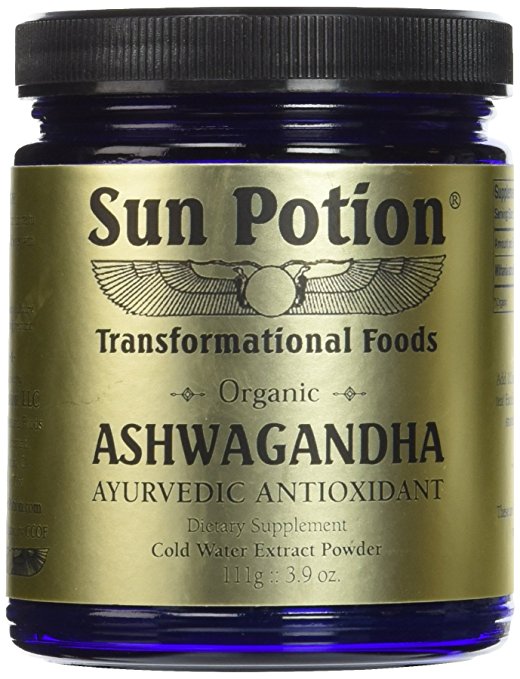
Holy Basil
If you’ve seen some of my full day of eating videos on YouTube, you’ll know this is something that makes it into my regular supplement rotation already. Now I will just be bumping it up more regularly! Holy basil helps fight fatigue, boosts the immune system, and helps regulate hormone levels.
Step 6: reduce heavy metal exposure
Did you know heavy metals are present nearly everywhere around us? It’s in the food we eat (produce, meats, store bought foods, etc.), products we put in our bodies like lotions/shampoo/deodorants, make up, plastics, household cleaning products, and even the air. Yes, they are unfortunately everywhere so no matter our efforts, to a certain extent there will be exposure. Instead of becoming absolutely crazy about reducing our toxic load because we will never escape it completely, there are certain things that can be done to reduce our exposure. Here are the things I will be much more mindful of from here on out:
- buy organic produce
- buy organic packaged products
- buy organic grass-fed/grass finished
- avoid plastics and use glass containers for storing food, glasses for drinking
- buy all natural & organic household products (make up, skin care, hair care, toothpaste, cleaning supplies) as MUCH as possible
- purchase a high quality water filtration/reverse osmosis system for the home
- avoid alcohol (easy for me, haven’t had any in at least 5-6 years anyways)
I have also started to do mild heavy metal detox. My approach is very different than something like chelation which can often times be too aggressive on the body. Instead of loading up on supplements to detox the liver, I am adding very gentle supplements and foods into my regular routine.
- chlorella/spirulina
- extra vitamin C rich foods
- cilantro
- milk thistle
- dandelion tea
And there you have it! That my friends is how you take your own health into your own hands. You know in your heart that something isn’t quite right in your body. You trust your instincts. If you listen to your body, its constantly firing little messages at you. Don’t wait until something gets totally out of hand before you take action. If you feel a certain way whether it be fatigued with zero energy or crashing energy by the afternoon, skin issues, headaches, digestive problems, stomach aches, irregular/painful/missed menstrual cycles, brain fog, lack of sex drive, aches and pains, or any other “weird” thing your body might be doing… do not just sit back and think it will eventually just fade away. Take it seriously.
You owe it to yourself to feel your absolute BEST day in and day out!
It IS possible to live a life with so much energy, vitality, and optimized moods. Don’t settle for “Man, it sure sucks to get old” mentality. You’re body is telling you something… listen to it!

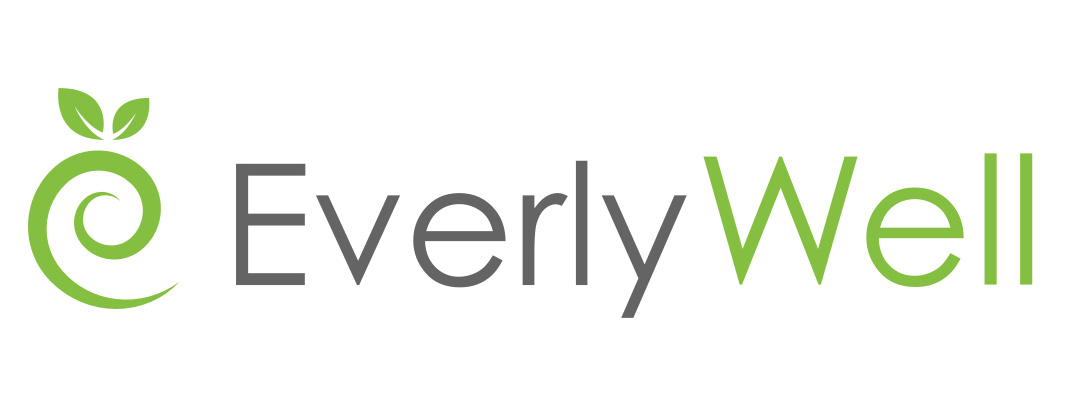
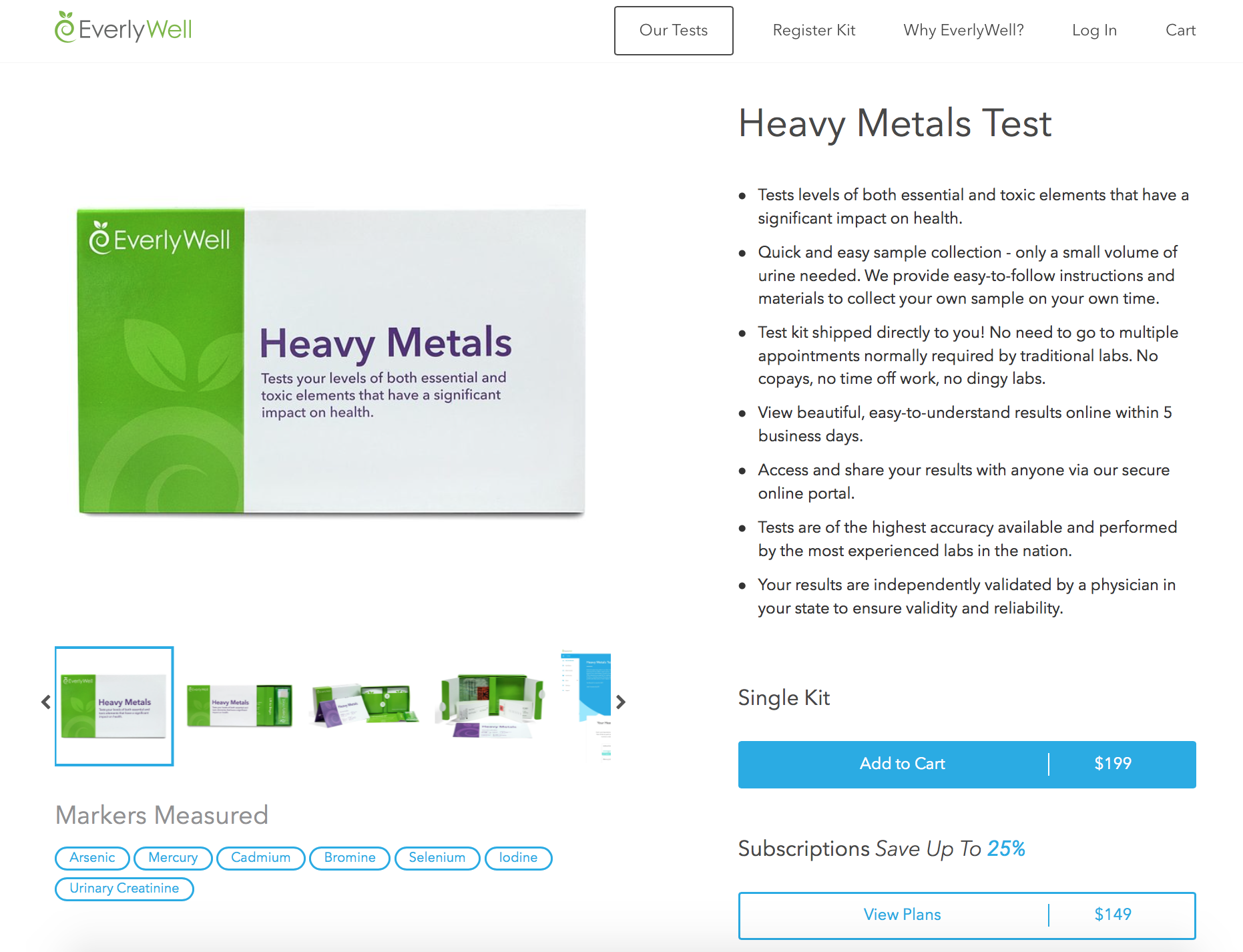

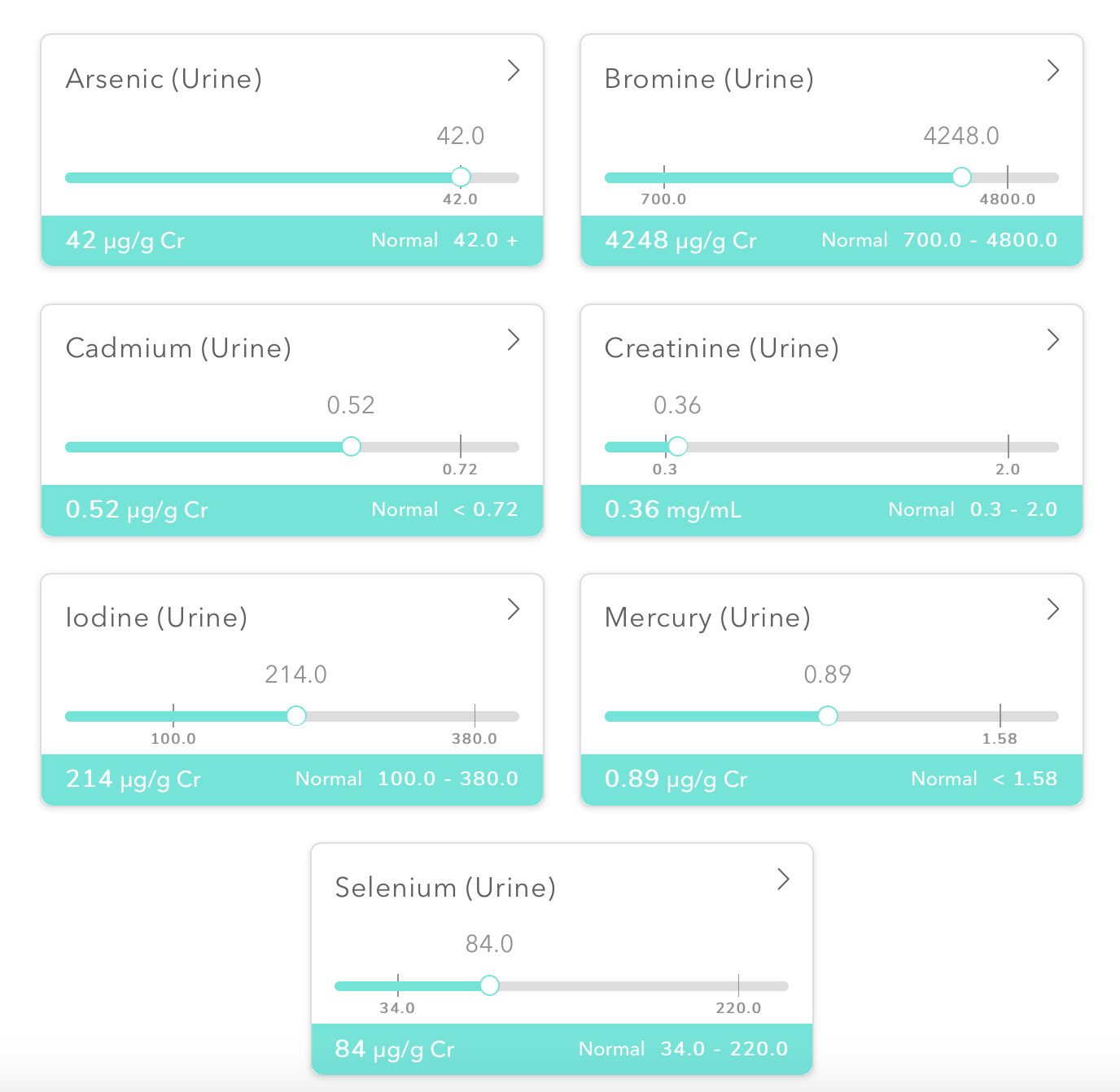
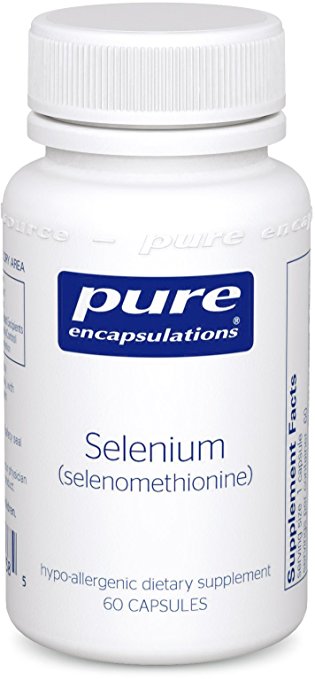

No Comments